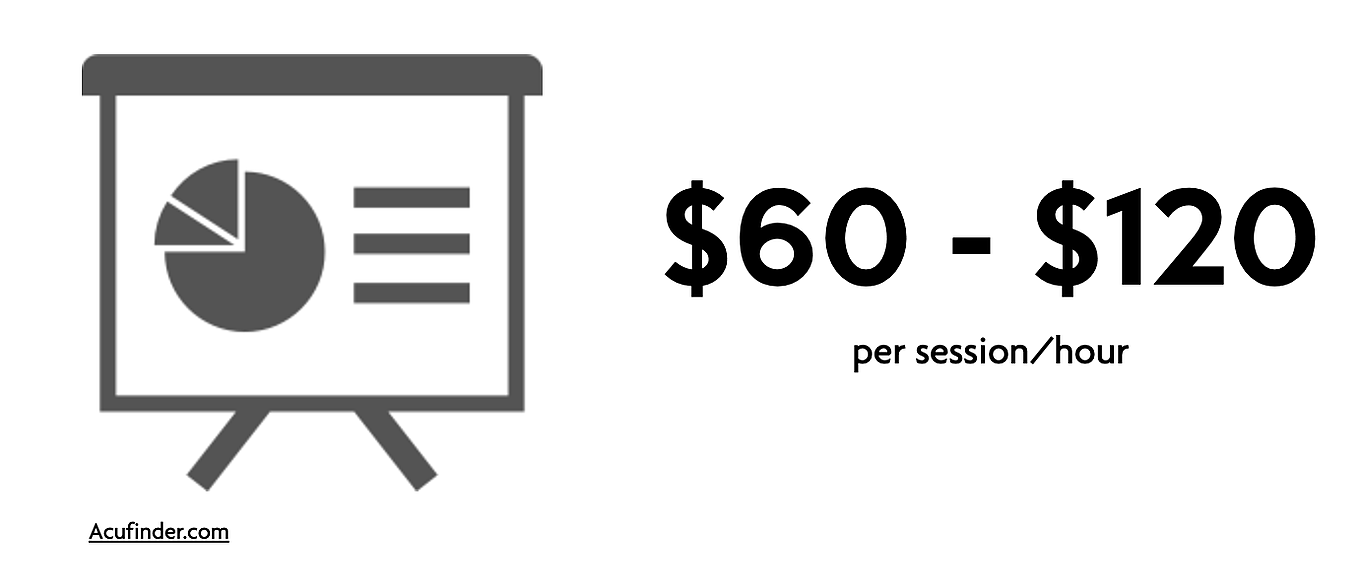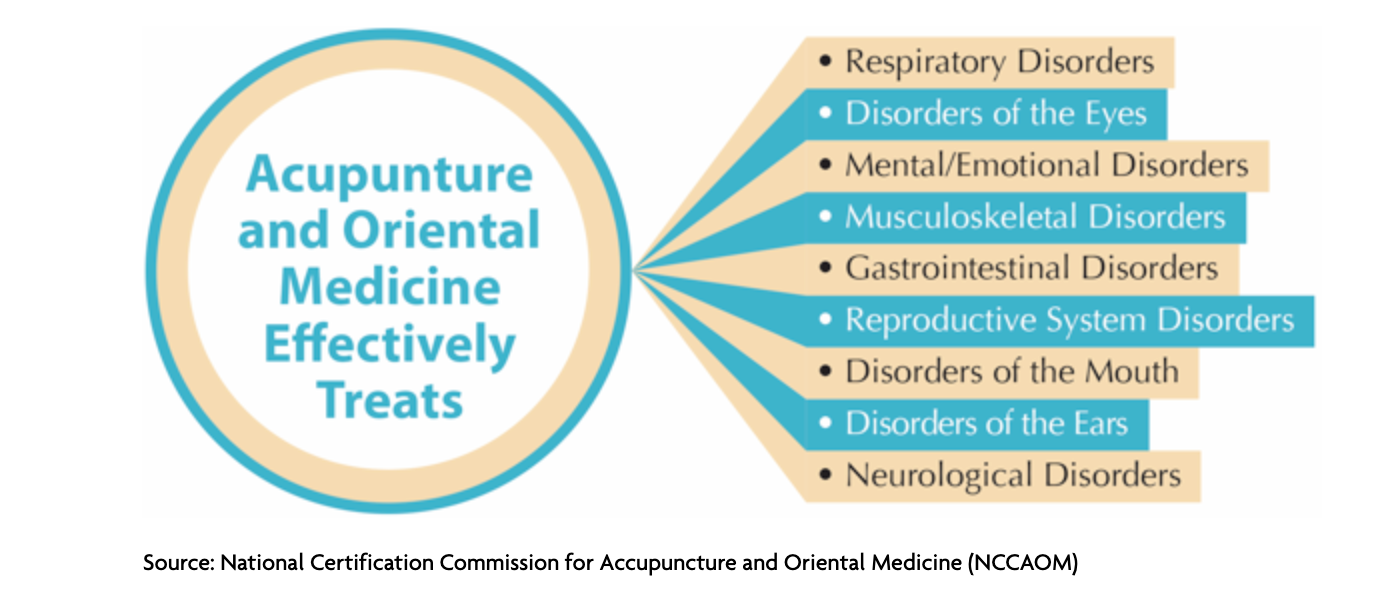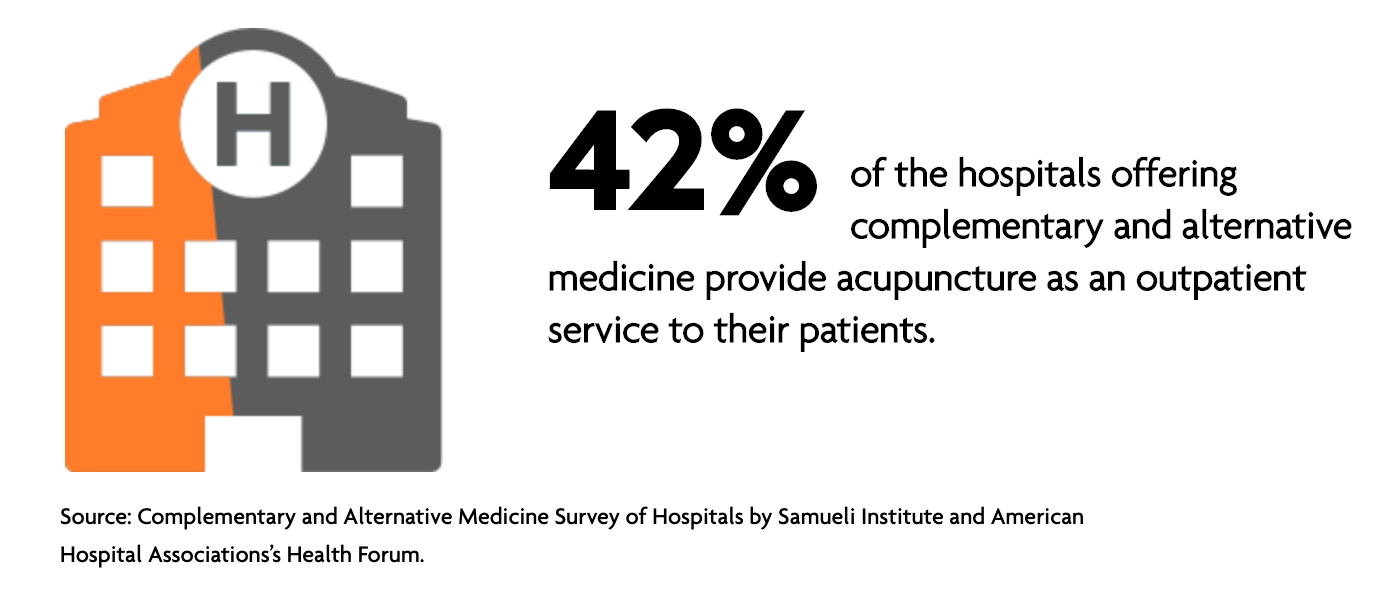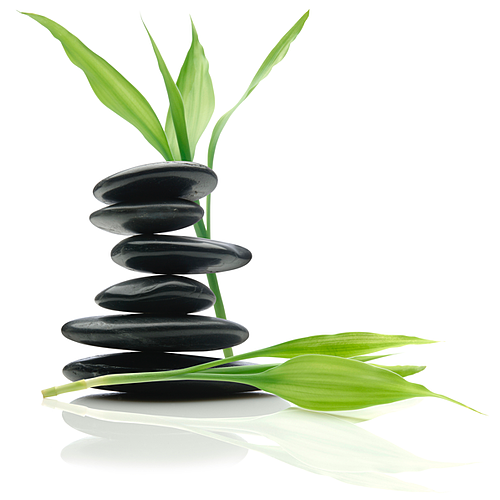About This Page
This page is designed to help give an overview of the acupuncture industry to those considering pursuing a career in Acupuncture with or without a specialization in Herbal Medicine. The admissions team here at National University of Health Sciences knows that aspiring Acupuncture practitioners have a lot to think and learn about before they decide if, when, and where to pursue their degree. We hope this informational guide will bring you real insight into exploring an exciting career as an Acupuncture practitioner.
Introduction to the Field
What does an acupuncturist do?
Western and eastern medicine both offer unique perspectives fundamental to health care today. You may be surprised to learn just how many oriental medicine practitioners are already working integratively at health care facilities across the United States. Acupuncture is increasingly being recognized as an effective treatment for a variety of conditions.
In the recent years, opioid epidemic has risen to a top concern in America. As doctors continue to limit opioid prescriptions, natural medicine is being recognized as a worthy alternative by the mainstream medical community. Several health care and government organizations, including The American College of Physicians, (ACP), The Joint Commission, State Attorneys General, as well as the White House, have highlighted complementary and alternative medicine, including acupuncture, chiropractic medicine, and naturopathic medicine as effective and first line of treatments for chronic pain.
Beyond this specific crisis, there has been a growing shift to include acupuncture and oriental medicine in the main health care industry and many hospitals and treatment centers across the United States are incorporating integrative medicine practices. In fact, 42% of the hospitals offering complementary and alternative medicine provide acupuncture as an outpatient service to their patients.
What benefit does an Herbal Medicine specialization provide?
Herbal Medicine relies on a highly comprehensive and individualized diagnosis of a patient’s Qi (or chi) energy. The weakness, excess, or imbalance of Qi affects key organ systems in herbal medicine and is the underlying cause of disease and disharmony. The herbal medicine practitioner uses a broad scope of therapies to restore balance to a patient’s Qi, thereby encouraging health and healing.
In addition to acupuncture, tai chi, tuina (meridian bodywork therapy), and qi gong (mind, breath, and physiological exercises) a practitioner of herbal medicine will employ dietary therapy as well as the full range of traditional herbal medicine. Herbal medicine encompasses the prescription of single herbs, complex herbal formulas, and patent herbal medicines in pill form.

The goal of acupuncture is to promote healing through rebalancing the patient’s Qi (or chi) energy. When the Qi is weak, excessive, or blocked, it can cause illness and disease.
Acupuncturists assess a patient’s symptoms or pattern of disharmony by using a set of diagnostic skills that involve four areas; questioning, palpation, visual inspection, and olfactory-auditory data collection. An acupuncturist determines the necessary treatment principle and strategy to prompt the patient back to functional harmony by discriminating the exact pattern of the body’s physiological response to disease-causing factors. (Source: NCCAOM)
The acupuncturist then employs several techniques in order to treat the patient: the stimulation of specific points on the body, by insertion of very fine, sterile, stainless steel needles to elicit a predictable physiological response. This stimulus may also be administered to the points using mild electrical stimulation (with or without needles), pressure techniques with the hands (acupressure), or the application of heat by various methods, such as Moxibustion. (Source: NCCAOM)
How do Acupuncture health care providers practice?
Acupuncture practitioners are able to:
- Treat patients effectively and holistically with a wide variety of healing skills.
- Run their own business or work as an associate in a group or integrative practice.
- Those with specialization in herbal medicine are able to prescribe traditional herbal medicine to their patients, which gives them a wider scope of treatment options than acupuncture.
- Become certified as acupuncturist by the National Certification Commission of Acupuncture and Oriental Medicine (NCCAOM). Those seeking licensure as an acupuncturist physician or practitioner must pass national board examinations conducted by NCCAOM, as well as apply for licensure in the state where they plan to practice. The professional organization representing Acupuncture practitioners is the American Association of Acupuncture and Oriental Medicine (AAAOM).
Career Outlook and Industry Statistics



According to BLS.org, people across all age groups are becoming increasingly interested in alternative or complementary health care, which is why the demand for integrative medicine is growing in the United States. If you are considering a career in acupuncture, there has never been a better time to invest in an advanced degree in this field.
Acupuncture and herbal medicine (AHM) practitioners can create lucrative careers with flexible work schedules that are rewarding on many levels. Careers in acupuncture often allow you to choose your frequency of patients, offering a more balanced work and personal life. AHM practitioners are also able to spend more time developing a collaborative relationship with patients, assisting them in maintaining their health, and promoting a healthy lifestyle. Today, acupuncturists can expect to earn between $60 to $120 per hour-long session, according to acufinder.com, a trusted acupuncture resource and referral website.
Did you know that the World Health Organization (WHO) recognizes acupuncture and herbal medicine as an effective treatment for over 43 conditions under nine major health categories, from mental health disorders to gastrointestinal disorders?
Acupuncture is increasingly becoming part of the main health care industry and many hospitals and treatment centers across the United States are incorporating integrative medicine practices, including acupuncture. 42% of the hospitals offering complementary and alternative medicine provide acupuncture as an outpatient service to their patients.
Career Options for Acupuncturists
Acupuncture graduates have a variety of different options after completing a degree, such as:
- Have a solo practice as a holistic acupuncturist
- Work at hospitals that include integrative practice opportunities
- Join an established acupuncture practice
- Work in an integrative healthcare clinic
- Teach acupuncture and herbal medicine
- Sail the world as a cruise ship acupuncturist
- Work with an herb or acupuncture or supply company
- Conduct research projects to advance the profession forward
6 Questions to Ask Before Selecting Your Program
Once you decide that you are interested in a career in acupuncture, you’ll be faced with the task of choosing a program that will best prepare you to become a successful practitioner. Selecting a school for your acupuncture program can be challenging. You should start by asking important questions like the ones listed below:
Hidden Toggle
Which school will best prepare you for the future of health care?
Integration: Look for a school that gives you experience in “integrative medicine.” This means a program where acupuncture practitioners train to work in cooperation with other health professionals, such as MDs, DCs, NDs, etc.
What we offer: National University prepares graduates for the future of health care by offering a campus dedicated to integrative medicine. You’ll study and work side-by-side with students and faculty from its chiropractic and naturopathic medicine programs. This experience prepares you to understand and speak with a wider range of medical professionals when you graduate.
Additionally, as one of only two schools in the U.S. to offer programs in chiropractic medicine, naturopathic medicine, and acupuncture all on one campus, our students have a rare opportunity to earn multiple degrees and save both time and money while expanding their skills and earning potential.
Which school offers the most beneficial opportunities for clinical training?
Geography: Consider a school located in a thriving health care job market which results in greater employment opportunities after graduation. Look for other universities, hospitals, veterans’ clinics, science and health industries nearby as well as convenient public transportation (airports, trains, buses).
Clinic Opportunities: Consider the clinical phase of the program. You should spend ample time observing and treating actual patients under the supervision of clinical faculty, learning how to write and maintain medical records, and gain the confidence and skills to succeed when you start your own practice.
What we offer: National University is conveniently located 15 miles from the city of Chicago and its diverse neighborhoods, with its rich tradition of herbal medicine shops and practitioners.
The on-campus Whole Health Center affords students the opportunity to work with a variety of patients in a diverse clinic setting that includes outstanding facilities such as private treatment rooms and a large herbal dispensary.
Prior to graduation, NUHS students also have the opportunity to work with specific populations.
Our acupuncture students also get real on-the-job experience in a medical environment, working together with MDs to reduce pain for patients at one of the nation’s busiest urban hospitals — Cook County’s John H. Stroger, Jr. Hospital.
Which school provides the most comprehensive medical school education?
Basic Sciences: Any program which combines western and eastern science in its curriculum, should include basic science courses such as anatomy, pathology, neurology, etc.
Clinical Sciences: Review the clinical science coursework and practical training in the program. This part of an Acupuncture degree teaches students important skills in diagnosing patient conditions, performing physical exams, and utilizing acupuncture and other herbal medicine techniques. Students learn through practical training how to build successful doctor-patient relationships.
What we offer: At National University, eastern traditional medicine meets modern western science. AHM students learn fundamental biomedical science and modern medical diagnostics including coursework in radiology, pathology, physiology, microbiology, and public health. NUHS offers one of few acupuncture programs in the world that incorporates the dissection of cadavers for acupuncture point and meridian studies as part of anatomy coursework.
Which school delivers the most in-depth acupuncture instruction?
Evidence-based: Understand the technique instruction, to be sure that the acupuncture techniques taught are backed by research proving their effectiveness. Look for a school that offers evidence-based instruction and technique.
Hands-On: Understand how AHM techniques are taught. You want a school that will give you the opportunity for hands-on learning from the first year of your acupuncture medicine education. And you want a school that provides master teachers who are leaders in their field.
What we offer: At National University, students get a full immersion in eastern medicine. You’ll study the complete range of traditional diagnostic techniques such as tongue and pulse analysis. You’ll learn point location and correct needle techniques and get rich exposure to oriental healing arts such as tui na, qi gong, moxibustion, and cupping.
Which school invests in providing campus facilities to help students thrive?
It is important to choose a school that invests in the success of their students and prepares them to confidently enter the health care industry.
What we offer: National University prides itself on providing a campus that helps students excel. Our facilities include:
- On-campus Whole Health Center clinic provides students the opportunity to work collaboratively with other health care students and practitioners in this integrative setting.
- Large and well-stocked herbal dispensary where students learn how to correctly choose and prepare effective herbal prescriptions, granular preparations, etc.
- Top of the line gross anatomy lab where oriental medicine and acupuncture students learn western anatomy and eastern meridian theory through hands-on dissection of a human cadaver.
- Life-size 3-D interactive Anatomage Table offers students, faculty, and clinicians access to an advanced digital visualization system to augment anatomy education.
- Training and Assessment Center (TAC) where students are able to learn, practice and be assessed on their diagnosis and patient interaction skills.
- A comprehensive Learning Resource Center, one of the largest medical libraries in the area that houses a huge collection of books, print and electronic journals, ebooks, bibliographic databases, and more.
Which school supports your success?
Tutoring and Academic Support: Check if the professors teach classes directly or use assistants. Ask if the school offers free peer tutoring (where senior students provide help in specific topics).
Business Classes: Discover what business classes are included in the curriculum. When you graduate, you’ll most likely be starting your own business, and you’ll also need to understand insurance, billing, marketing, and business management procedures. Be sure the school you pick offers classes that give you these skills.
Additional Education: Consider what extra courses are available to students on the weekend or online, that could augment your primary degree. Is continuing education reserved primarily for practicing physicians, or is it also available to AHM students? Does the institution offer an opportunity to enroll in dual-degrees or multiple programs so that you can earn more credentials with less time and money?
Strong Alumni Network: Look for a school where alumni are involved, communicate with each other and current students, and where you can reach out to them for mentoring and career support.
Accreditation: Look for a school that is accredited by the Accreditation Commission for Acupuncture and Herbal Medicine (ACAHM). That way, you can be certain that you’ll be able to sit for a licensing exam conducted by National Certification Commission for Acupuncture and Oriental Medicine (NCCAOM).
What we offer: In addition to opportunities to earn multiple degrees on one campus, National University offers an array of student support services that contribute to a successful educational experience. These include academic advising, peer tutoring, flexible tracks, various student clubs, and more.
Acupuncture Programs Offered at NUHS
The DAc program is a 134-hour program and can be completed in 8 trimesters. Upon the completion of the first 107 credits (6 trimesters) on campus, students will receive the Master of Acupuncture (MAc) degree. The last 27 credits are fully online in an asynchronous format which allows students to adapt the program in a more convenient schedule to finish each term in the allotted time frame, to stay on track and complete in one year.
Doctor of Acupuncture Completion Program (DAc-C)
The DAc-C program is available to those who have completed a masters degree in Acupuncture or Oriental Medicine. This 27-hour program is completely online in an asynchronous format which allows students to adapt the program in a more convenient schedule to finish each term in the allotted time frame, to stay on track and complete in one year. The program also includes a preceptorship requirement that can be completed with a local practitioner.
The MAc program is a 107-credit hour program and is 6 trimesters in length. The program covers the history, theory and philosophy of acupuncture as well as rigorous training in diagnosis and treatment planning. Students will also graduate with a solid foundation in the basic sciences of western medicine, having developed skills necessary for integrative and collaborative practice in health care settings of their choosing. Students have the ability to apply for the DAc program concurrently with the MAc.
Master of Acupuncture with a Specialization in Herbal Medicine (MAc-HM)
The MAc-HM program is a 149-credit program, completed in 8 trimesters which adds a specialization in Herbal Medicine to the acupuncture curriculum. Students will gain a deeper understanding of herbal medicine which may broaden their future practice opportunities. This training will also help prepare students who intend to take the Herbology portion of the professional licensure board exams.
Navigating the Admissions Process at NUHS
What are the admission requirements?
GPA and Degree requirements for Doctor of Acupuncture (DAc) program
Applicants need to have earned:
- 90 semester hours of undergraduate credit (no bachelor’s degree required)
- 2.50 (on a 4.00 scale) minimum cumulative undergraduate GPA (Students with a 3.00 cumulative GPA will be given priority)
GPA and Degree requirements for Doctor of Acupuncture Completion (DAc-C) program
Applicants need to have earned:
- 90 semester hours of undergraduate credit with a 2.50 (on a 4.00 scale) minimum cumulative undergraduate GPA (Students with a 3.00 cumulative GPA will be given priority)
- Completion of a masters degree in Acupuncture or Oriental/Herbal Medicine
GPA and Degree requirements for Master of Acupuncture (MAc) program
Applicants need to have earned:
- 90 semester hours or 120 quarter hours of undergraduate credit for the MAc program
- 2.50 (on a 4.00 scale) minimum cumulative undergraduate GPA (Students with a 3.00 cumulative GPA will be given priority at NUHS)
GPA and Degree requirements for Master of Acupuncture with Specialization in Herbal Medicine (MAc-HM) program
Applicants need to have earned:
- 90 semester hours of undergraduate credit
- 2.50 (on a 4.00 scale) minimum cumulative undergraduate GPA (Students with a 3.00 cumulative GPA will be given priority)
What are some helpful tips on admission?
Most acupuncture schools will require the following documents:
- Application for admission
- Application fee and deposit
- Essay question responses
- Character references
- Undergraduate transcripts
NOTE: Most acupuncture schools will not require the following:
- Standardized tests (e.g. MCAT, GRE)
When should I apply?
Most acupuncture schools have a rolling admissions calendar, which means they accept applications year-round. At National University, new classes start September, January, and May of each year! You’ll want to begin the application process 6 –9 months before you intend to start your Acupuncture graduate program. This will allow ample time for all admission requirements to be completed, and ensure that there are still spots left in the program.
What will make me a more competitive applicant?
You can make yourself more attractive to admissions officials at acupuncture schools by showing your interest and commitment to the field. You can demonstrate this by having a “shadow experience” – spending time in an acupuncturist practitioner’s office in order to understand if this is the right career for you. National University offers “shadow experiences” before and/or after you apply with a network of practicing graduates nationwide.
Download the Acupuncture Guide Today!
If you’re passionate about pursuing a future as an Acupuncture Physician or Practitioner, we invite you to download our resource—A Career Guide to Becoming an Acupuncturist.
National University of Health Sciences Acupuncture Program
National University’s Acupuncture programs give you a comprehensive classical curriculum in acupuncture coupled with training in how to balance an Eastern medicine approach with Western science.
Our Academic Superiority
National University’s acupuncture program is rigorous, uncompromising, and built on a solid foundation in the basic sciences. We maintain the highest admission standards for our students. Students receive a traditional apprentice-style learning with clinical observation classes. The on-campus integrative medical clinic affords students the opportunity to work within a diverse setting with access to a large herbal dispensary.

Our Dedication to Integrative Medicine
National University prepares graduates for the future of health care by offering a campus dedicated to integrative medicine. In fact, you’ll study and work side-by-side with students and faculty from its naturopathic medicine and chiropractic medicine programs. As a result, you will be better prepared to work and thrive in today’s integrated health care market.
Our History of Leadership
Founded in 1906, National University has over 110 years of experience in graduating leaders in the natural health profession. A driving force for moving natural health care into mainstream medicine, we were the first to offer hospital experience to chiropractic students, push for national accreditation of chiropractic colleges, and publish medically-indexed and peer-reviewed scientific journals.
Next Steps
The team at National University hopes that this page was helpful as you discern if, when, and where, to pursue an acupuncture degree.
Please do not hesitate to reach out to us if you have any questions about our programs or the student experience. Call the Office of Admissions at 1-800-826-6285 or email us at [email protected].

Learn More About Our Acupuncture Program From Our Graduates
Denise Shostek
Margaret Thompson-Choi, MSOM
Learn why Margaret feels NUHS uniquely prepared her to work in co-managing cases with reproductive endocrinologists, and how her own life journey gave her a special perspective on helping women with seeking help with fertility and childbirth.
Ryan Secor, MSAc
Shortly after graduation, Ryan started work in an exciting integrative medical clinic in downtown Chicago. “The education that I received from National has helped me to look at each patient from not only an eastern but also a western health perspective.”
Cherlyn Coplon, MSOM
Cherlyn credits her NUHS education for helping her build a successful practice in suburban Chicago. “I fell in love with National after having a tour of the campus and getting a feel for the style of teaching. I really liked the anatomy lab. No other school in the country offers that.”
Featured Acupuncture Blog Posts
We invite you to check out a few of our most recent Acupuncture blog posts to help you stay in-the-know on all things acupuncture.
Reflecting on the Trimester
Another trimester has flown by, and wow, what an eventful one it’s been! As the weeks pass, I find myself getting more and more excited about the path I’m on.
Screentime as a Student
As a graduate student, I’ve come to realize that excessive screen time is a double-edged sword. On one hand, technology is integral to my studies—researching articles, writing papers and attending online seminars.
Battling Flu Season with Traditional Chinese Medicine
That time of year has come again. The unpredictable weather changes in the Midwest make it easier than ever for us to catch a cold or get sick. When illness strikes, our first instinct is often to grab over-the-counter medications or visit a doctor for a quick fix. However, more and more people are turning to Traditional Chinese Medicine (TCM)…



